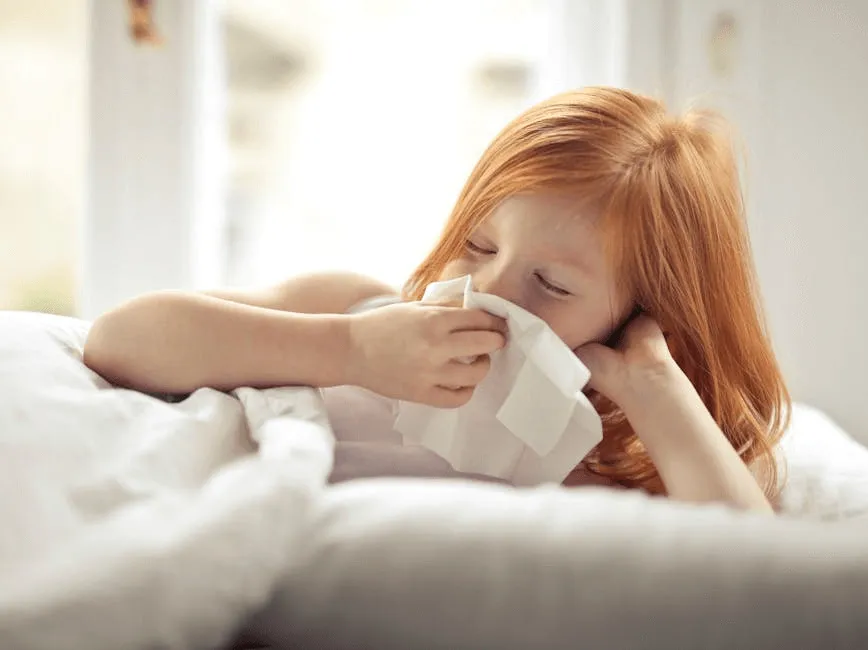Just when you thought you'd packed away the tissues until winter, your child wakes up with a runny nose and sore throat in the middle of July. Contrary to what many believe, colds aren't just a winter thing. Viruses, such as enteroviruses, often spread more readily in warm weather. In fact, several non-influenza respiratory viruses circulate year-round, with certain types actually peaking during summer months, affecting millions of children annually.
These summer colds can catch families off guard, disrupting vacations, camps, and outdoor play when children should be enjoying their break. The good news? With the right approach, you can help your little one bounce back quickly.
Read on to learn how to recognize, treat, and prevent summer colds so your child can get back to making summer memories, and learn where to find the best primary care physician in East Brunswick for pediatric sick visits.
What Are the Symptoms of a Summer Cold in Kids?
Summer colds in children typically present with a mixture of symptoms: a scratchy, sore throat often appears first, followed by a persistent runny nose, sneezing fits, and noticeable fatigue that can dampen your child's usual energy. Many children also develop a low-grade fever, usually under 101°F, which helps distinguish a cold from seasonal allergies.
Unlike allergies, summer colds frequently bring mild body aches that make your child feel genuinely unwell rather than just sniffly. While these symptoms resemble those of a winter cold, they can feel more intense during hot weather as congestion and fever intensify with the summer heat. Parents can expect the typical cold to run its course in seven to 10 days, though the first few days typically bring the most pronounced symptoms before gradually improving. Knowing how long a cold lasts in kids helps set expectations and highlights the difference between cold and allergies if symptoms linger.
How to Treat Your Child's Summer Cold at Home
Since viruses cause most summer colds, home remedies for your child’s cold and supportive care are usually all that is necessary. There are three specific ways parents can support their children while recovering from a summer virus:
- Hydration: Offer water frequently throughout the day, and make hydration appealing with electrolyte-rich drinks or homemade fruit popsicles that soothe sore throats while replenishing fluids lost through fever or exposure to hot weather.
- Rest: Though your child may resist slowing down during summer fun, adequate rest remains essential for their immune system to fight the virus effectively. Creating a comfortable, cool environment for naps and setting earlier bedtimes until symptoms improve is the best way parents can encourage more rest.
- Congestion relief: Try using a cool-mist humidifier in your child’s bedroom to moisten airways, particularly at night when symptoms often worsen. Complementing this with a saline nasal spray several times daily helps flush irritants and thin mucus, which can make breathing easier and recovery quicker.
When Should You Take Your Child to the Doctor for Cold Symptoms?
It can be nerve-wracking wondering when to call a pediatrician and when to keep monitoring your child at home. While most summer colds can be resolved with home care, certain warning signs require medical attention. Parents should contact a doctor for kids in East Brunswick for a sick visit if their child develops:
- A high fever exceeding 101°F that persists for more than three days
- Symptoms that suggest complications: ear tugging or complaints of ear pain could signal an ear infection
- Wheezing, rapid breathing, or visible chest retractions that indicate possible respiratory distress and require prompt evaluation
Additionally, if your child seems unusually lethargic, refuses to drink fluids, or appears significantly different from their usual self, don't hesitate to make a sick visit rather than waiting for symptoms to escalate.
What can Parents Do to Prevent Kids from Catching Summer Colds?
While completely avoiding summer colds may be challenging for even the most vigilant parents, you can significantly reduce your child's risk by establishing strong preventive habits:
- Make thorough hand washing a non-negotiable routine, especially before meals and after playground visits, public outings, or camp activities where viruses readily spread.
- Teach proper hand washing techniques — scrubbing with soap for at least 20 seconds — and carry hand sanitizer for times when soap isn't available.
- Minimize exposure by keeping your child at a reasonable distance from visibly ill friends or family members.
- Find out about illness policies with daycare providers or camp counselors to ensure sick children stay home until no longer contagious.
- Bolster your child's natural defenses by maintaining consistent sleep schedules even during summer's relaxed routines. Most school-age children need nine to 12 hours every night.
- Offer immunity-supporting foods rich in vitamins C and D, zinc, and antioxidants like colorful fruits, vegetables, and lean proteins that provide the nutritional foundation for fighting off viruses.
- Keep your child up to date on their childhood immunizations, including the flu vaccine and RSV immunization.
- Maintain your child’s well-child checkups.
Where to Find the Best Doctor in East Brunswick for a Pediatric Sick Visit
When your child isn’t feeling their best, you want care that’s not only fast and effective but also kind and reassuring. At Hyatt Health & Wellness, we offer pediatric sick visits in East Brunswick that prioritize both comfort and quality care, so your little one feels safe and supported from the moment they walk in.
Our team takes the time to listen, explain, and guide you through every step, whether it’s a summer cold, a persistent fever, or a minor injury that needs attention. With Dr. Hyatt’s thoughtful, preventative approach and our all-in-one family care model, we make it easier for you to get the help you need, right when you need it.

